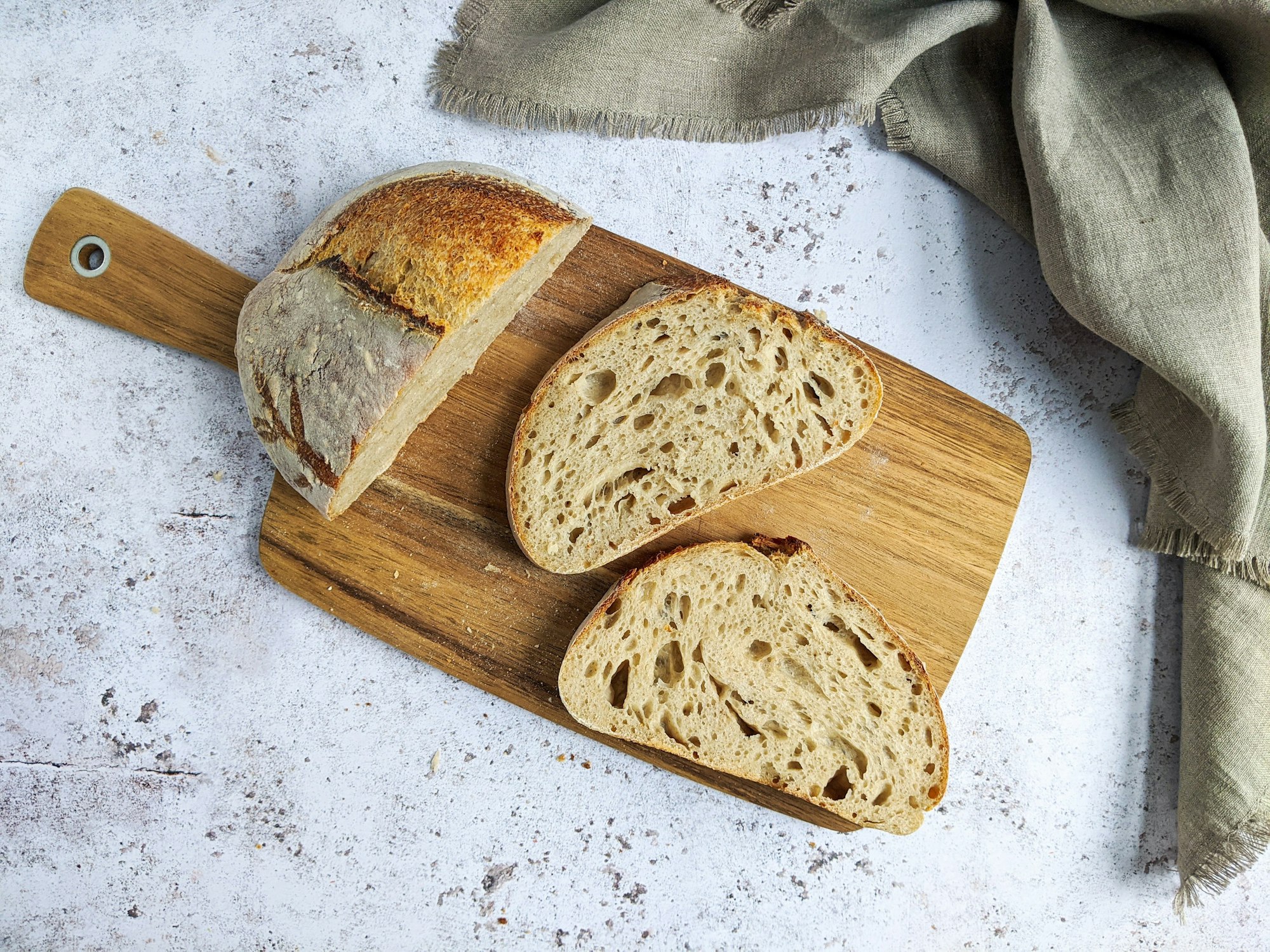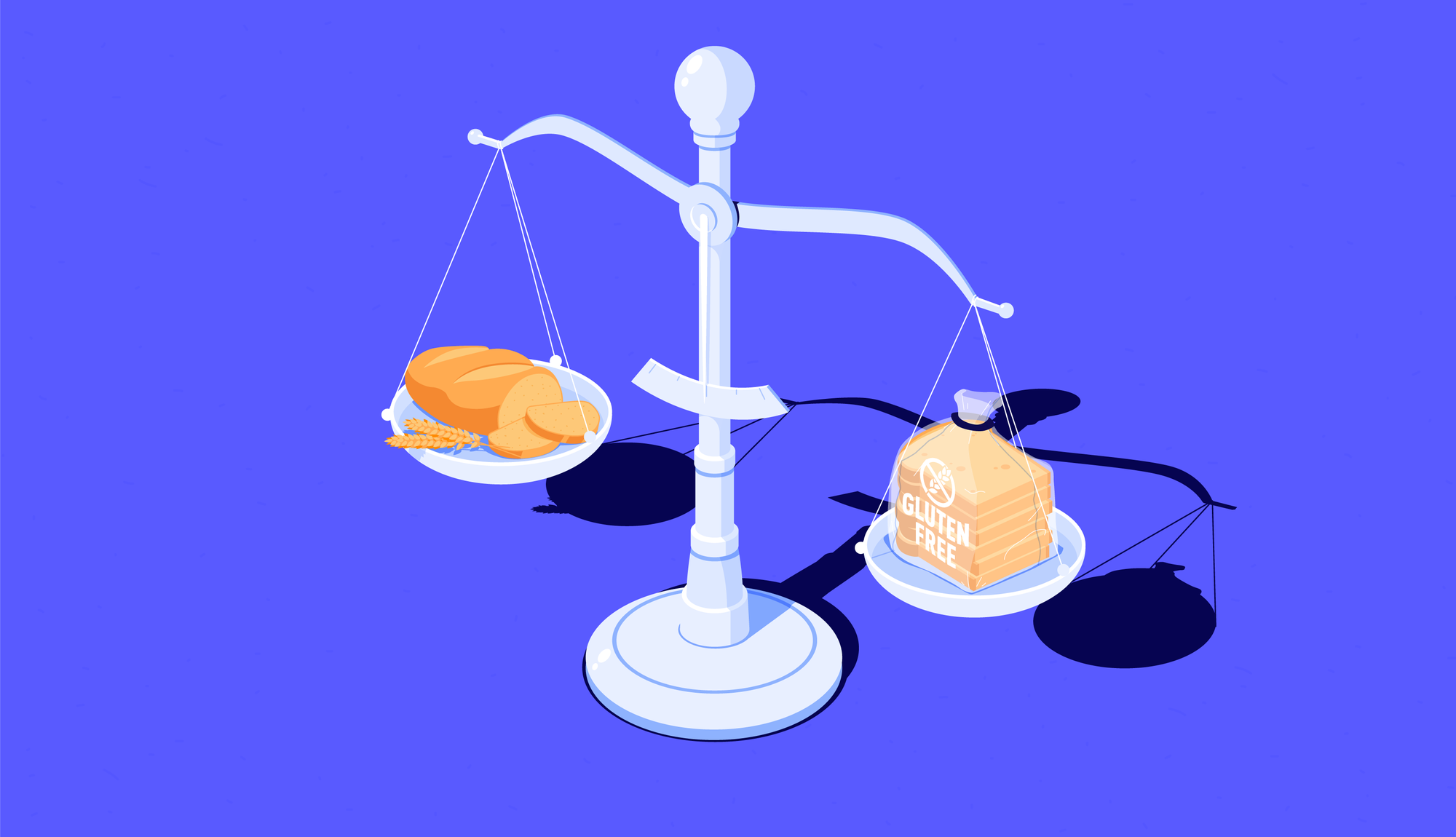The Gluten-free movement has risen in popularity in recent years, with supermarket aisles now packed full of gluten-free bread, cakes and pasta. Many claim a diet excluding gluten can improve performance, fuel weight loss, and reduce gastrointestinal issues, but is there any evidence to support this? Keep reading to find out.
Table of contents
- What is gluten?
- Coeliac disease and gluten intolerance
- Non-coeliac gluten sensitivity
- The gluten-free diet
- Gluten-free diet and nutritional deficiencies
- Naturally gluten-free grains
- Not all bread is made equal
- Gluten and the gut microbiome
- Final Thoughts
What is gluten?
Twenty years ago, you likely hadn't even heard of gluten. Now, you can't open a menu or turn down an aisle without being bombarded with gluten-free options. So what is it?
Gluten is a protein found in rye, wheat, and barley-based foods, including flour, pasta, semolina, couscous, bulgur, beer, and brewer's yeast. The protein can also be found in wheat strains such as triticale, spelt and Khorasan (Kamut).
Some processed foods, such as table condiments, can also contain gluten derived from wheat starch. Gluten acts as a binding agent and helps foods maintain their shape. In fact, "gluten" derives from the Latin word for glue!
Coeliac disease and gluten intolerance
Most people can digest gluten with no issues; however, some individuals have an auto-immune condition called coeliac disease. Coeliac disease is hereditary, meaning it runs in families; if you have a parent with the condition, you also have a one in ten chance of developing it.
When those with the illness eat gluten, it triggers inflammation in the small intestine and damages the small finger-like projections called villi along the gut wall. Undiagnosed, coeliac disease can damage the gut lining and lead to nutrient malabsorption, resulting in mineral and vitamin deficiencies. Symptoms include:
- Fatigue
- Loss of appetite
- Stomach pain
- Diarrhoea
- Constipation
Around 1% of those in the U.S. are diagnosed with coeliac disease, though it is estimated that more than two million Americans are living undiagnosed with coeliac disease.
Those with a wheat allergy also have to avoid glutenous products unconditionally. People often confuse wheat allergy with coeliac disease, though the two are separate conditions; for example, those with wheat allergy can experience symptoms when eating gluten-free products if they still contain parts of the wheat other than gluten.
Wheat and gluten can be present in unexpected products, including playdough, imitation crab meat, soups, marinara sauce and processed meats, among other sources. With this in mind, always check the labels carefully before buying a product, even if you wouldn't expect it to contain wheat and gluten.
☝DID YOU KNOW?☝ According to Coeliac U.K., the average time it takes for a diagnosis is 13 years.
Non-coeliac gluten sensitivity
Some individuals test negative for coeliac and wheat allergies yet continue to report digestive symptoms when consuming gluten, known as non-coeliac gluten sensitivity (NCGS). The condition affects around 0.5% to 13% of the population.
These statistics are so broad because there is limited research into the disorder, and it lacks a clear clinical definition. Unlike wheat allergy and coeliac disease, NSGS is not genetic and does not appear to damage the gut. Nonetheless, for those who experience NCGS, it might make sense to limit gluten intake.
If you suspect that you have a gluten sensitivity, speak to a G.P. or registered nutritionist. With their guidance, you can try an elimination diet. However, this should never be conducted without medical supervision as this can lead to nutritional deficiencies and, in some cases, disordered eating.
The gluten-free diet
Despite the relatively small prevalence of those with medical reasons to restrict gluten, there has been a sharp increase in those uptaking the gluten-free diet, with many citing a desire to be healthier as the motivating factor.
For example, a Mintel survey of 2000 individuals following a gluten-free diet found that 247 were excluding the protein for reasons other than sensitivity or coeliac disease.
Of this group, 65% did so in a bid to be "healthier", whilst up to 25% did so to lose weight. Likewise, a study of 2000 Australians revealed 11% were restricting wheat and gluten, despite less than 1% of them having a medical reason to do so. Even more strikingly, as many as one-third of Americans are reportedly cutting down on gluten!
This rise is fuelled by aggressive marketing and anecdotal reports from high profile figures, including athletes and celebrities, many claiming gluten-free living fuels performance and helps them shed weight. What's more, some individuals with conditions like IBS report that a gluten-free diet improves gastrointestinal symptoms.
Despite these claims, there is no compelling evidence that healthy individuals stand to benefit from eating gluten-free products. In fact, the evidence suggests that there may be nutritional risks to doing so in healthy individuals.
Gluten-free diet and nutritional deficiencies
Research suggests that gluten-free products are often lacking in folic acid, fibre, selenium, and B12, among other nutrients. Others have raised concerns that these products are higher in fat, sugar and salt, although an Australian study evaluating over 3000 supermarket products found little nutritional difference between gluten-free and gluten products.
With that said, the Wall Street Journal also conducted a study on products in the U.S., finding that gluten-free options sometimes contain less fibre and proteins whilst simultaneously having higher sodium and carb levels.
Either way, these studies suggest gluten-free products are either worse for you or no better than their gluten-containing counterparts, neither of which is a ringing endorsement of these expensive products.
And when I say expensive, I mean it: a 2015 study found that gluten-free bread products are on average 267% more expensive than their gluten-containing counterparts! It is hard to justify spending that much dough (excuse the pun) without any evidence for health benefits.
Whichever way you cut it, the gluten-free industry is big business. Whilst this benefits the companies selling gluten-free products, there is no evidence that it helps healthy individuals without coeliac disease or gluten sensitivity.
Additionally, some evidence suggests a gluten-free diet can put individuals at a higher risk for eating insufficient fibre and heart-healthy whole grains. A research paper at Ohio State University sought to analyse the grain intake of those restricting gluten for coeliac disease.
Out of 174 individuals, over 80% consumed less than half the recommended daily servings of grain, whilst only 1.1% met the suggested daily amounts. Likewise, a 26-year prospective cohort study in the British Medical Journal also suggested that a gluten-free diet can increase the risk of grain deficiency.
Considering the long list of health benefits associated with whole-grain consumption, this is concerning. For starters, whole grains are prebiotic, meaning they feed beneficial bacteria in the gut and fuel the production of short-chain fatty acids. This might explain why one study found a gluten-free diet resulted in fewer beneficial bacteria populations in the gut microbiome.
Beyond this, multiple studies have shown an association between whole-grain consumption and reduced risk of heart disease, partly owing to their rich nutritional content, including fibre, iron, B vitamins and calcium.
Last but not least, a study in the British Medical Journal found that whole-grains might be able to reduce body-weight and low-grade chronic inflammation too, without impacting the composition of the gut microbiome.
Naturally gluten-free grains
If you have coeliac disease or a wheat allergy, you can still reach the recommended amounts of grains each day. All it requires is a little bit of planning. For example, the coeliac disease foundation lists a range of naturally gluten-free grains, including:
- Sorghum
- Amaranth
- Cassava
- Chia
- Corn
- Flax
- Buckwheat
- Quinoa
- Millet
Fruits, vegetables, beans and legumes are all great sources of fibre for those who have to follow a gluten-free diet.
☝IMPORTANT☝ There is some evidence to suggest that naturally gluten-free grains are sometimes contaminated with gluten-containing grains during processing and harvesting. The Coeliac Foundation recommend you only purchase versions that are tested for the presence of gluten and contain less than 20 parts per million.
Not all bread is made equal

The nutritional value of bread varies according to the preparation method, and not all bread is made equal! For example, there is compelling evidence that whole-grain and sourdough bread are more nutritious and digestible than refined wheat bread.
In a study at Monash University, researchers found that the fermentation process used to make sourdough might reduce the levels of fructans in bread, a type of resistant carbohydrate known to trigger IBS symptoms.
In fact, some types of sourdough, namely spelt and oat, have been labelled low-FODMAP foods. FODMAP stands for fermentable oligo-, di- and mono-saccharides, and polyols- a group of compounds known to be resistant to digestion that can exacerbate IBS. This could explain why many with IBS find that they can eat sourdough but not refined white bread, which is not fermented.
Gluten and the gut microbiome
The reasons behind gluten sensitivity are poorly understood, but researchers believe that the microbiome may play a role. Although the research is in its infancy, there is evidence to suggest that gut bacteria can influence gluten metabolism, either soothing or exacerbating gluten intolerance.
In short, different bacteria break down gluten in different ways, with some producing chemicals that may cause an immune reaction and others producing harmless metabolites (molecules resulting from chemical reactions).
When you take the Atlas Microbiome Test, we analyse the types and proportions of bacteria in your gut and rank your microbiome's ability to break down gluten on a scale of 1-10. This test is not diagnostic and cannot substitute a medical examination. If you experience symptoms when eating wheat or gluten, you should consult your doctor immediately and inquire about tests.
☝TIP☝ When you take an Atlas Microbiome Test, you will receive a rating from 1-10 of your gut microbiome's gluten metabolism potential. Likewise, the Atlas DNA Test can tell you whether you have a genetic predisposition for gluten intolerance.
Final Thoughts
In short, whilst some individuals have a medical reason to eliminate gluten, the large majority of people stand to gain little from cutting it out. If anything, many excluding gluten from their diets are likely doing more harm than good and could be getting insufficient fibre, selenium and folic acid, among other nutrients. Worse still, they are paying a premium to do so!
Unless you have gluten sensitivity, coeliac disease or a wheat allergy, there is no convincing evidence that a gluten-free diet can benefit your health. With that said, not all bread is nutritionally equal. With this in mind, aim to eat healthy whole grains and sourdough bakes instead of refined white bread.
☝️DISCLAIMER☝This article is for informational purposes only. It is not intended to constitute or be a substitute for professional medical advice, diagnosis, or treatment.
















